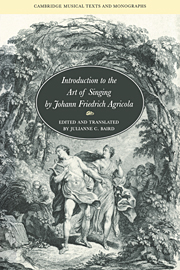Book contents
- Frontmatter
- Contents
- Acknowledgments
- Introduction: Agricola's treatise
- INTRODUCTION TO THE ART OF SINGING
- Translator's preface
- Foreword of the author
- Introduction of the author
- 1 Observations for the use of the singing teacher
- 2 Concerning appoggiaturas
- 3 Concerning trills
- 4 Concerning divisions
- 5 Concerning recitative
- 6 Remarks intended especially for the music student
- 7 Concerning arias
- 8 Concerning cadenzas
- 9 Remarks for the use of the professional singer
- 10 Concerning improvised variations of melodies
- Notes
- Bibliography
- Index
Introduction: Agricola's treatise
Published online by Cambridge University Press: 10 December 2009
- Frontmatter
- Contents
- Acknowledgments
- Introduction: Agricola's treatise
- INTRODUCTION TO THE ART OF SINGING
- Translator's preface
- Foreword of the author
- Introduction of the author
- 1 Observations for the use of the singing teacher
- 2 Concerning appoggiaturas
- 3 Concerning trills
- 4 Concerning divisions
- 5 Concerning recitative
- 6 Remarks intended especially for the music student
- 7 Concerning arias
- 8 Concerning cadenzas
- 9 Remarks for the use of the professional singer
- 10 Concerning improvised variations of melodies
- Notes
- Bibliography
- Index
Summary
On 16 April 1755, an advertisement appeared in Marpurg's Historischkritische Beyträge requesting subscriptions for a book on the art of singing (Die Kunst zu singen) that Johann Freidrich Agricola intended to publish. The book appeared two years later, in 1757. It was called Anleitung zur Singkunst and consisted of a translation of Pier Francesco Tosi's 1723 Italian treatise Opinioni de' cantori antichi e moderni (reflecting the bel canto style), with a running commentary by Agricola. Agricola's Anleitung soon came to be recognized as invaluable not only for teachers and beginning students, but also for advanced students and professional singers. Charles Burney, for example, described it as “the best book on the subject in German,” and hailed its author as “the best singing master in Germany.” The present volume makes Agricola's work available for the first time in English.
By 1757 the work of Tosi (a famous castrato as well as a singing teacher) was already considered out of date in a musical world of rapidly changing styles and tastes. Nevertheless, Tosi had made an important contribution in writing the first basic treatise on singing in the modern sense. He codified important aesthetic principles and gave practical directions for the singers of his time. He defended the ancient style against the moderns, who had lost interest in counterpoint, favoring fast mechanical divisions and interminable virtuosic cadenzas.
- Type
- Chapter
- Information
- Publisher: Cambridge University PressPrint publication year: 1995



